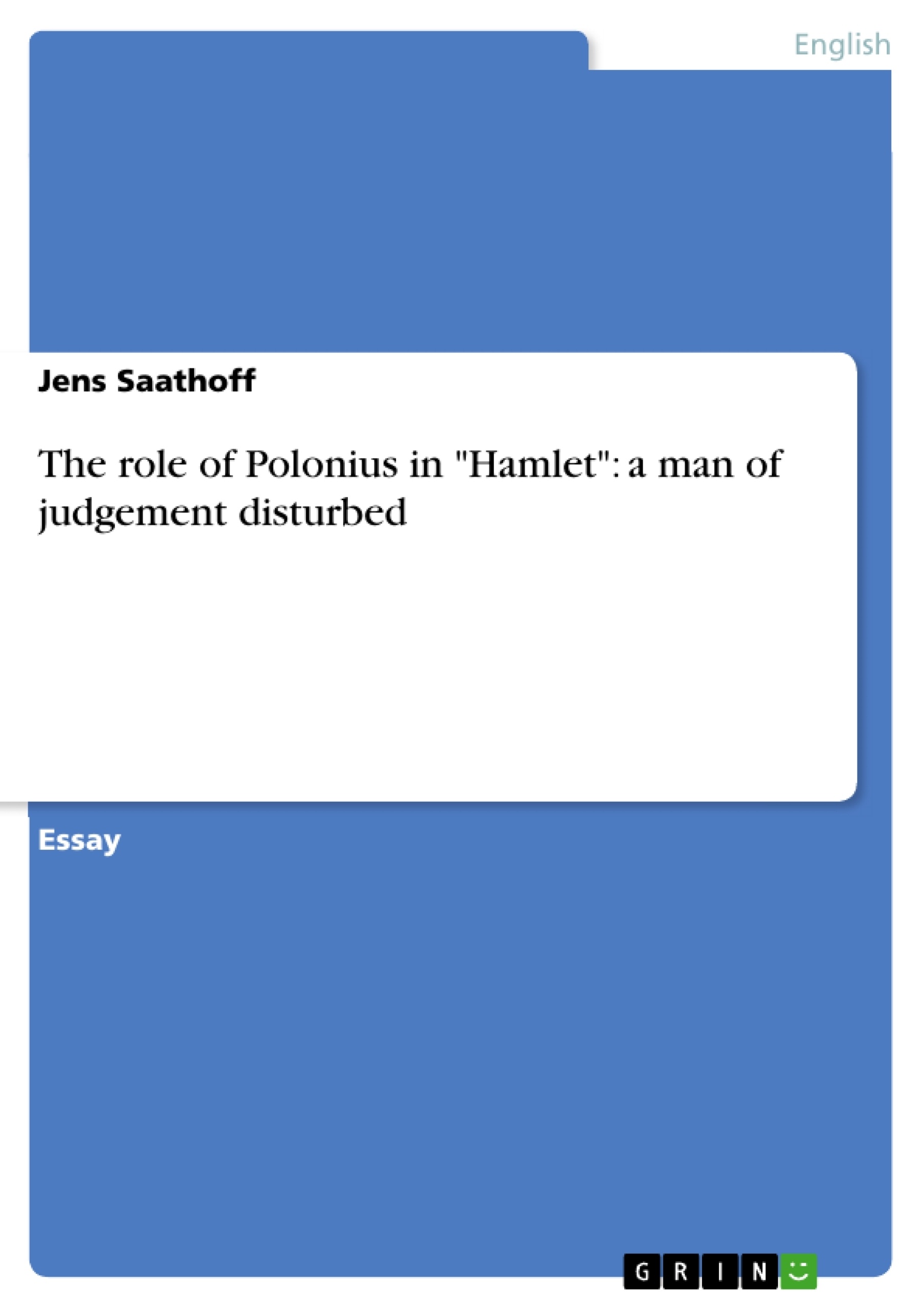The role of Polonius is a comparatively short one, since he is killed in the third act and thus does not appear in the last two acts. And although his death exerts a decisive influence on the further plot of the play, the consequences of his death are not really part of his role, they rather relate to and depend on Ophelia´s and Laertes´s reactions to his being killed. That might explain why many critical studies of Hamlet seem to neglect Polonius or at least are far from giving a full portray of this character. However, it is remarkable that Polonius appears in all the scenes of the second and the third acts and also in the scenes 2 and 3 of the first act. And the fact that his entrances are so frequent indicates a certain importance. So what can be said about this character?
Table of Contents
- 1. Introduction
- 2. Polonius's principles
- 3. Hamlet's judgement
- 4. Conclusion
Objectives and Key Themes
This text aims to provide a detailed analysis of the character of Polonius in Shakespeare's Hamlet, focusing on his role and influence despite his relatively short stage presence. It examines Polonius's actions and motivations, exploring the complexities of his character beyond the stereotypical portrayal often found in critical studies.
- Polonius's reliance on generalizations and commonplaces in his judgments.
- The contrast between Polonius's experience and his inability to adapt to new situations.
- The role of Polonius's age and potential senility in shaping his decisions.
- Polonius's manipulative and dishonest behavior.
- The dramatic irony surrounding Polonius's self-awareness.
Chapter Summaries
1. Introduction: This introductory chapter sets the stage for the analysis by acknowledging the relative brevity of Polonius's role in the play and the subsequent neglect he often receives in critical discussions. It highlights the frequency of Polonius's appearances in the play, suggesting a significance that warrants further investigation. The chapter emphasizes the importance of understanding Polonius's character, considering his influence despite his early demise and the consequences of his death on other characters.
2. Polonius's principles: This chapter delves into the core principles that govern Polonius's actions and judgments. It examines his self-proclaimed role as a counselor and analyzes his advice to Laertes, highlighting his reliance on commonplace sayings and generalizations. The chapter explores Polonius's tendency to employ proverbs and generalizations as a means of understanding and navigating the complexities of the world around him. It emphasizes how this reliance leads to superficiality, as evident in his focus on outward appearances and general concepts of obedience and honor. His experiences in love and his manipulative actions towards his children are discussed, revealing a more complex figure than a simply foolish old man. The chapter concludes by examining Polonius's inability to learn from new experiences and his resulting misjudgments.
Keywords
Polonius, Hamlet, Shakespeare, character analysis, judgment, generalizations, commonplaces, experience, age, senility, manipulation, dishonesty, dramatic irony, political corruption.
Frequently Asked Questions: A Detailed Analysis of Polonius in Shakespeare's Hamlet
What is the purpose of this text?
This text offers a comprehensive analysis of Polonius's character in Shakespeare's Hamlet. It aims to move beyond stereotypical portrayals and delve into the complexities of his motivations and actions, highlighting his significance despite his relatively short stage presence.
What topics are covered in the analysis?
The analysis explores several key themes, including Polonius's reliance on generalizations and commonplaces in his judgments; the contrast between his experience and his inability to adapt to new situations; the role of his age and potential senility in shaping his decisions; his manipulative and dishonest behavior; and the dramatic irony surrounding his self-awareness. The text also examines Polonius's political actions and their implications.
What is the structure of the text?
The text is structured into four chapters: an introduction, a chapter focusing on Polonius's principles and actions, a chapter analyzing Hamlet's judgment in relation to Polonius, and a concluding chapter. It also includes a table of contents, a statement of objectives and key themes, chapter summaries, and a list of keywords.
What are Polonius's main characteristics as portrayed in the text?
The text portrays Polonius as a complex character. While he holds a position of power and influence, he is shown to be reliant on oversimplified judgments and proverbs, inflexible in his thinking, and prone to manipulation and dishonesty. His age and potential senility are also considered contributing factors to his flaws in judgment.
How does the text approach the analysis of Polonius?
The analysis adopts a detailed and nuanced approach, examining Polonius's actions, motivations, and the dramatic irony surrounding his character. It challenges simplistic interpretations and seeks to provide a richer understanding of his role within the play.
What are the key takeaways from the analysis?
The key takeaway is a more profound understanding of Polonius as a complex character whose actions, despite their flaws, significantly influence the plot and other characters. The analysis emphasizes the importance of considering his age, experience, and manipulative tendencies when assessing his role in Hamlet.
What are the keywords associated with this analysis?
The keywords associated with this analysis include: Polonius, Hamlet, Shakespeare, character analysis, judgment, generalizations, commonplaces, experience, age, senility, manipulation, dishonesty, dramatic irony, political corruption.
What is the significance of Polonius's relatively short stage presence?
Despite his relatively short time on stage, Polonius's actions and influence on other characters are significant. The analysis explores this apparent contradiction, highlighting how his actions and decisions have far-reaching consequences within the play's narrative.
- Citar trabajo
- Jens Saathoff (Autor), 1993, The role of Polonius in "Hamlet": a man of judgement disturbed, Múnich, GRIN Verlag, https://www.grin.com/document/177995



